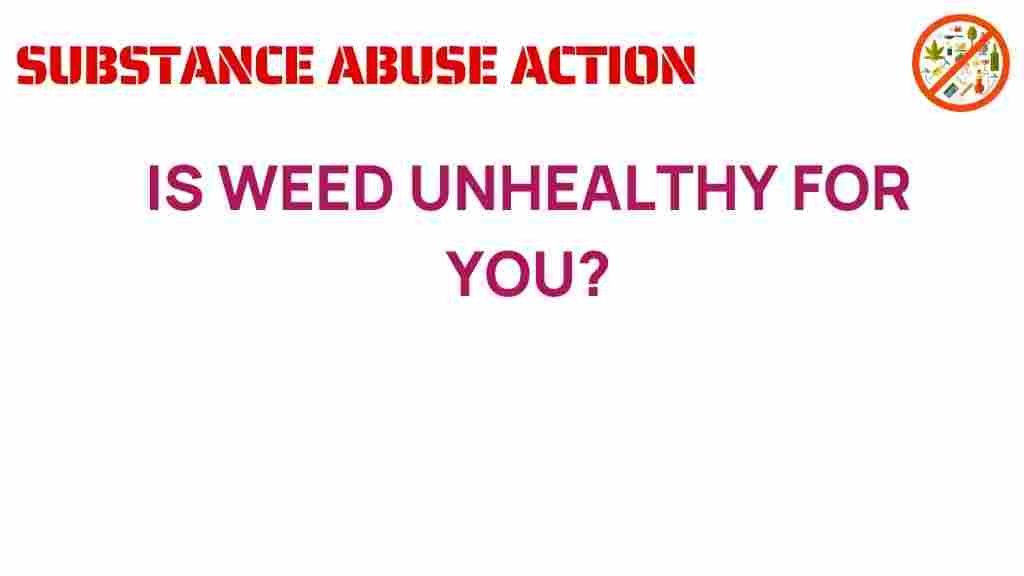Is Weed Unhealthy for You? Understanding the Health Effects of Cannabis
The debate surrounding the health effects of weed has been ongoing for decades. As more states and countries legalize cannabis for medical and recreational use, it’s essential to unpack the myths and facts about its impact on health. This article will explore various aspects of cannabis, including its components like THC and CBD, its potential for addiction, and its effects on mental health. We’ll delve into the research available, aiming to provide a balanced view on whether weed is unhealthy for you.
The Components of Cannabis: THC and CBD
Cannabis contains over 100 different compounds known as cannabinoids, but the two most well-known are tetrahydrocannabinol (THC) and cannabidiol (CBD). These compounds interact with the body’s endocannabinoid system, producing various effects.
- THC: This is the psychoactive compound responsible for the “high” associated with cannabis use. It can influence mood, perception, and cognitive function.
- CBD: Unlike THC, CBD is non-psychoactive and is often touted for its potential therapeutic benefits, including reducing anxiety and inflammation.
Health Effects of Weed
The health effects of weed can vary significantly based on the individual, the type of cannabis used, and the method of consumption. Here are some potential health effects associated with cannabis use:
- Short-term Effects: Users may experience altered senses, mood changes, impaired memory, and motor coordination issues.
- Long-term Effects: Prolonged use can lead to respiratory issues (if smoked), cognitive decline, and potential dependence.
- Mental Health Effects: Some research suggests a correlation between heavy cannabis use and increased risks of anxiety, depression, and psychosis, particularly in individuals predisposed to these conditions.
Understanding Addiction and Substance Use
One of the most significant concerns surrounding cannabis is its potential for addiction. While many people use cannabis without developing a dependence, it’s essential to recognize that it can happen.
According to research, about 9% of individuals who use cannabis may develop a substance use disorder, and this number increases to about 17% among those who start using in their teens. Factors that contribute to cannabis addiction include:
- Age of first use
- Frequency and quantity of use
- Genetic predisposition to addiction
Research on the Health Effects of Cannabis
Recent studies have provided insights into the health effects of cannabis, but the results can be mixed. Here are some key findings:
- Medical Use: Cannabis has been shown to be effective in treating chronic pain, nausea from chemotherapy, and certain neurological conditions.
- Cognitive Effects: Some studies indicate that heavy, long-term use can impair cognitive function, particularly in adolescents.
- Mental Health: While some users report relief from anxiety and depression, others may experience increased symptoms, especially with high-THC strains.
It’s crucial to consider the source of information and the context of cannabis use when interpreting these studies. Engaging with healthcare professionals and relying on reputable research can provide a clearer understanding.
Step-by-Step Guide: Responsible Cannabis Use
If you choose to use cannabis, following a responsible approach can help mitigate potential health risks. Here’s a step-by-step guide:
- Educate Yourself: Understand the different strains, THC and CBD concentrations, and how they may affect you.
- Consult a Professional: Speak with a healthcare provider, especially if you have underlying mental health issues or are taking other medications.
- Start Slow: If you’re new to cannabis, start with low doses and gradually increase as needed to find your comfort level.
- Choose Your Method: Consider alternative consumption methods, such as edibles or vaporizers, which may be less harmful than smoking.
Troubleshooting: What to Do if You Experience Negative Effects
Sometimes, cannabis use can lead to unwanted side effects. Here are some troubleshooting tips:
- Stay Calm: If you feel anxious or paranoid, remind yourself that these feelings are temporary.
- Hydrate: Drink water to help alleviate dry mouth and other mild side effects.
- Rest: If you feel overwhelmed, find a quiet space to relax until the effects subside.
- Seek Help: If you experience severe reactions, don’t hesitate to reach out to a medical professional.
Conclusion: The Bottom Line on Weed and Health
In conclusion, the question of whether weed is unhealthy for you is complex. While cannabis can offer benefits, particularly for medical users, it also carries risks, especially concerning addiction and mental health. Understanding the health effects, being aware of the research, and using cannabis responsibly can help individuals make informed choices.
As the conversation around cannabis continues to evolve, staying informed and seeking professional advice is crucial for anyone considering its use. For more information about cannabis research, you can visit this external link. If you’re interested in exploring more about responsible cannabis use, check out our internal resource.
Ultimately, whether cannabis is healthy or unhealthy varies from person to person, and ongoing research will continue to shed light on this fascinating plant.
This article is in the category Health and created by SubstanceAbuseAction Team
